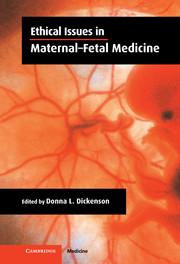Book contents
- Frontmatter
- Contents
- List of contributors
- Acknowledgements
- 1 Introduction: recent debates in maternal–fetal medicine – what are the ethical questions?
- 2 Overview: a framework for reproductive ethics
- I GENERIC ISSUES IN PREGNANCY
- II INCEPTION OF PREGNANCY: NEW REPRODUCTIVE TECHNOLOGIES
- 9 Ethical issues in embryo interventions and cloning
- 10 A case-study in IVF: paternalism and autonomy in a ‘high-risk’ pregnancy
- 11 The ethics of secrecy in donor insemination
- III FIRST AND SECOND TRIMESTER
- IV THIRD TRIMESTER
- V NEONATAL LIFE
- Index
9 - Ethical issues in embryo interventions and cloning
from II - INCEPTION OF PREGNANCY: NEW REPRODUCTIVE TECHNOLOGIES
Published online by Cambridge University Press: 29 September 2009
- Frontmatter
- Contents
- List of contributors
- Acknowledgements
- 1 Introduction: recent debates in maternal–fetal medicine – what are the ethical questions?
- 2 Overview: a framework for reproductive ethics
- I GENERIC ISSUES IN PREGNANCY
- II INCEPTION OF PREGNANCY: NEW REPRODUCTIVE TECHNOLOGIES
- 9 Ethical issues in embryo interventions and cloning
- 10 A case-study in IVF: paternalism and autonomy in a ‘high-risk’ pregnancy
- 11 The ethics of secrecy in donor insemination
- III FIRST AND SECOND TRIMESTER
- IV THIRD TRIMESTER
- V NEONATAL LIFE
- Index
Summary
Introduction
Although the first IVF (in vitro fertilization) child has passed the age of majority, ethical dilemmas linked to the field continue to be subject to the world's scrutiny. Arguably, some are ‘classical’ problems of assisted reproduction, either because they pertain intrinsically to the essence of IVF (as in embryo research), or because they relate to techniques preceding IVF as a means of assisted reproduction (for instance, sperm donation). Another dilemma is that of embryo reduction, itself often a consequence of IVF techniques (although in the UK, since the Human Fertilisation and Embryology Act (1990), most multiple pregnancies of a high order are the consequence of non-licensed ovulation induction). Indeed some Scandinavian countries have either altered their legislation or professional codes of practice recently in order to limit embryo transfer to one or two embryos per cycle and to decrease the rate of multiple pregnancies. Embryo reduction is discussed by Mary Mahowald in Chapter 16 and will, therefore, not be dealt with at length here. Then there is the question of what responsibilities we owe to the children of assisted conception (an issue discussed by Christine Overall in Chapter 19).
The choice of issues to discuss has been narrowed down to newer techniques specifically linked to IVF, and only made possible when IVF itself matured into a more successful and more common treatment.
- Type
- Chapter
- Information
- Ethical Issues in Maternal-Fetal Medicine , pp. 149 - 160Publisher: Cambridge University PressPrint publication year: 2002
- 1
- Cited by



